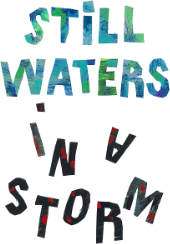Vanessa Manko
On a Saturday afternoon just before Halloween, I had the wonderful opportunity to meet with the children of Still Waters in Bushwick, Brooklyn. I arrived just as yoga class ended and everyone was putting away their mats and helping to replace and reposition the desks and chairs pushed against the walls. Then it was break time and I spoke to some of the kids as they sat on a neighboring building’s stoop. What were they reading? What were they planning to be for Halloween? Then we began the central work of Still Waters, reading and writing. I shared an excerpt of my novel with twenty-five expectant listeners, and while I was uncertain how they’d react—the story is one that chronicles the life of a Russian immigrant exiled in Mexico City—I was overwhelmed by their insightful responses and questions and how, when asked, they could point out the sensory work within the scene. We then turned toward an exercise in which they’d write a letter to someone or something they longed for, similar to what my character experiences while living in exile. Many of the children at Still Waters are first-generation immigrants or children of immigrants (as am I, if a few generations removed) and ties to the mother and father countries are still strong. “Dear Mexico,” some of them wrote. “Dear Guatamala.” “Dear Puerto Rico.” My character alone in Mexico City longed for the U.S. and these children absorbed that idea and then wrote of their own sense of longing for countries that seem, for them, far from the world of Bushwick. Others wrote about lost pets or to grandparents and another child insisted that she had nothing to write, until, with encouragement and a bit of time, she came up with a moving letter. Everyone read their letters out loud, some with help from friends or from Stephen, and one young girl who had never read her work out loud before found the courage to do so on this day. With a quiet, yet still clear voice she began to read and slowly but surely, word by word, sentence by sentence, while her peers tiptoed up behind her, offering support and nearly propping her up, willing her to finish, they helped her to pronounce more difficult words, whispering them into her ear and pointing to the page for the next sentence. If the letters the children wrote that day were about longing for a someone or someplace that was absent, the element of compassion, empathy and joy in shared accomplishments was strikingly present. Thank goodness for Still Waters and the work of these small hands writing on little yellow legal pads into the Brooklyn afternoon.
